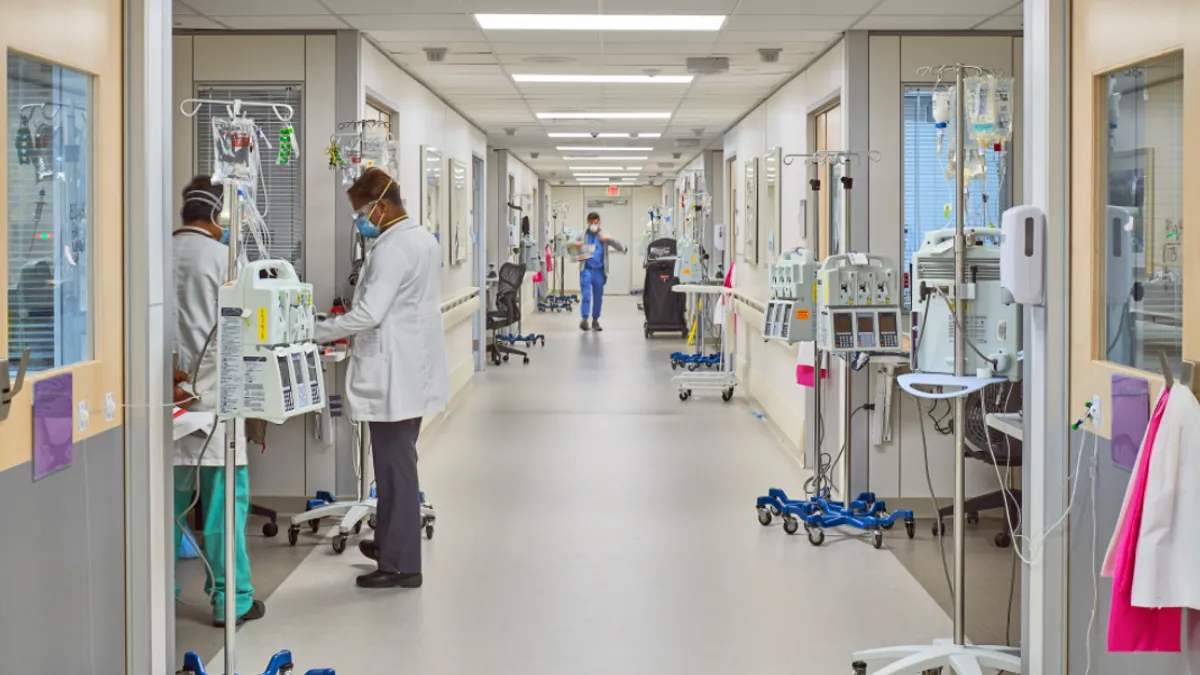Dive Brief:
- Hospital purchasing managers said Abbott's Alinity diagnostics platform, Intuitive Surgical's da Vinci robot, and hybrid cath labs to support transcatheter aortic valve replacement procedures are expected to lead their capital equipment purchases in the next 12 months, according to a UBS survey released Monday.
- In a sign that the overall spending environment for medical equipment is healthy and poised to expand, the average capital budget of the purchasing managers surveyed was projected to increase 5% in the year ahead. The level is up from the 3.5% growth forecast in September 2019.
- The survey also found a significant increase in patient monitoring initiatives by hospitals, compared to before the pandemic, with 84% of respondents indicating greater general floor monitoring is either occurring now or planned for the future.
Dive Insight:
The feedback from hospitals purchasing executives, gathered in the fourth quarter of 2020, shows capital equipment budgets remain resilient in the face of COVID-19.
Most purchasing executives expect their capital budgets to grow rather than shrink: 64% of managers predict a bigger budget, while only 18% look for a decrease and 17% foresee a flat budget, UBS found. Among the managers anticipating budget growth, 29% see an increase in the 5% to 10% range and 16% are expecting a 10% to 20% boost.
Abbott's Alinity testing products were most often cited by hospital purchasing managers as the top equipment investment anticipated in the next 12 months, with 19% of hospitals expecting to make a purchase, followed by Intuitive's da Vinci surgical system at 18% and hybrid cath labs for TAVR at 15%.
The Abbott Alinity line, part of its core laboratory business, has been one of the company's most anticipated growth drivers in recent quarters, as the COVID-19 pandemic spurred the company to accelerate product launches for the platform.
The findings of the UBS survey are a hopeful indicator for Intuitive Surgical, which warned last month of a slowdown in da Vinci procedures. The company declined to provide financial guidance for 2021, citing the effects of the ongoing pandemic and uncertainty about healthcare systems' finances.
The survey is in line with executive comments from other robotics players Zimmer Biomet and Stryker, both of which said that they placed over 100 Rosa and Mako systems, respectively, in the fourth quarter of last year. Zimmer CEO Bryan Hanson said during an earnings call last week that the Rosa system had the strongest quarter-over-quarter growth since being launched and brought in $100 million in gross revenue in 2020.
Further investment in hybrid cath labs would stand to benefit TAVR device makers Edwards Lifesciences and Medtronic, both of which have been hurt by recent procedure slowdowns. Hybrid cardiovascular catheterization labs combine the traditional diagnostic capabilities of a cath lab with the surgical functions of an operating room in one space.
Looking beyond the 12-month timeframe, purchasing managers' top equipment picks were DNA sequencing, Abbott Alinity, 3D mammography, Siemens' Atellica clinical chemistry/immunoassay, Danaher/Beckman's clinical chemistry/immunoassay and Globus Medical's Exelcius robot, the survey found.
Most purchasing managers (73%) think capital budgets will return to pre-COVID levels this year, while 21% see it happening in 2022. More specifically, 28% see a return to normal in the third quarter of 2021, 20% target the first quarter, 21% peg the fourth quarter and 4% expect never.











